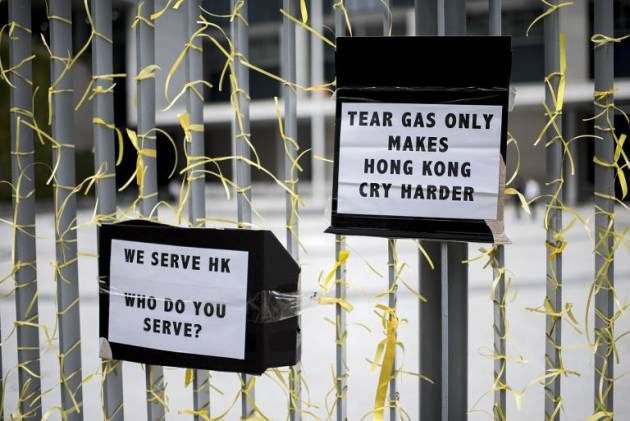The tumultuous week of protest that has shaken Hong Kong
Fears rise over end game for pro-democracy protests as rhetoric escalates on both sides
By David Pilling in Hong Kong
October 5, 2014
The tumultuous week that has shaken Hong Kong began with the tear-gassing of pro-democracy protesters and ended with a wave of seemingly orchestrated street thuggery. In between came scenes of carnival-like celebration as tens of thousands of impeccably organised and unfailingly polite students set up camp throughout one of the world’s most important financial centres in pursuit of their aim of “genuine” universal suffrage.
But as the rhetoric escalated in recent days from both Leung Chun-ying, Hong Kong’s embattled leader, and from Beijing, whose official media brusquely dismissed the protests as “futile”, what everyone really wanted to know was how this would end.
Mr Leung, whose resignation the students are seeking, raised the stakes by saying he would take “all necessary actions” to restore order by Monday. Some supporters of the students, including university professors, begged them to leave the streets before they got hurt.
“There’s all sorts of ways this can turn out badly,” said David Zweig, a China expert at Hong Kong University of Science and Technology, who said the students should declare a partial victory and go home rather than face a potentially violent crackdown. The alternative, he said, was being crushed, either slowly through a drawn-out waiting game, or quickly through the use of lightning arrests and more barrages of tear gas.
The pro-democracy protests, which have turned Hong Kong upside down, started with the occupation of government offices 10 days ago. Since then they have gone through several distinct, often confusing, phases, as the numbers involved ebbed and flowed and the dynamics of the cat-and-mouse game between protesters and government shifted.
After protests were triggered by the initial occupation of government offices on 26 September led by Joshua Wong, a 17-year-old high-school pupil, pro-democracy group Occupy Central brought forward its planned action to occupy the central business district. Then came the tear-gassing last Sunday night, a use of force that shocked many Hong Kong residents unaccustomed to robust police action. This brought another wave of sympathisers on to the streets.
As last Wednesday’s National Day bank holiday approached, the police virtually disappeared from the streets. That left swaths of the city to a party-like atmosphere, damped only by a lingering fear of what might come next. Jo Tong, a 26-year-old PE teacher, was camped out on one of the city’s main highways with a friend. She said her relatives in mainland China thought protesters like her were foolish. “They think you can’t challenge laws made in China,” she said. “You just have to obey.”
Markets, which weathered the 1997 handover and the 2003 outbreak of severe acute respiratory syndrome (Sars), were shaken but not stirred. In the holiday-shortened week, the Hang Seng index fell a modest 2.6 per cent, and actually rose 0.6 per cent on Friday amid signs that the protests might peter out. The Hong Kong dollar weakened marginally, but the peg with the US dollar held firm. “From a business standpoint, all our offices are open, our trading floors are open and only a couple of our branches are closed,” said one senior banker.
But the mood changed decisively again on Friday night as gangs of thugs – some allegedly with “triad” organised crime connections – beat up protesters in the Mongkok area of Kowloon. Pro-democracy supporters, many of whom stuck defiantly to their non-violent principles, accused the police of standing by as they came under attack.
“We didn’t fight back, but the police just stood there,” said Paul Lam, a 25-year-old purchasing assistant in a green flak jacket and black jeans. In the weekend that followed, parts of Mongkok, a busy shopping area on the opposite side of Victoria Harbour from the main protests, became a virtual no-go area as students and anti-occupy protesters fought running street battles.
At times arguments flared between pro-democracy leaders as they tried to bring their amorphous movement under greater tactical control. There were disagreements about whether protests had become too dispersed and whether to talk to the authorities without conditions. Albert Ho, a veteran pro-democracy campaigner, said it would be hard to get the students to go home unless they won some concrete concessions. “Ninety per cent of the protesters are very young people, aged between 20 and 30. We can’t tell them what to do and expect them to listen.”
In the absence of reliable polls, it has been hard to gauge public sympathy for the demonstrations. Although most people in Hong Kong say they want more democracy, some see the students’ action as naive and disruptive.
Critics have also argued that the pro-democracy camp, in rejecting Beijing’s offer of limited universal suffrage, will end up losing everything. Instead of the proposed system for 2017, in which 5m registered voters would get the chance to choose from a list of pre-screened candidates, the next chief executive would be elected under current rules. Mr Leung, the current chief executive, was selected with just 689 votes from the members of a 1,200-strong pro-Beijing committee that decides.
“You can’t change China,” said Mr Zweig. “The best you can do is slow down what I call the ‘mainlandisation’ of Hong Kong. I don’t know if the students can ever go beyond that.”








